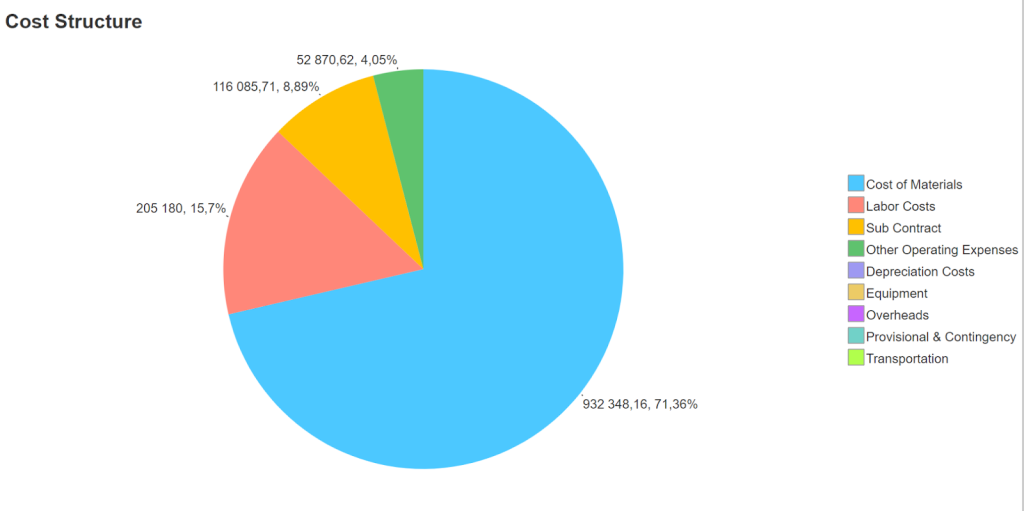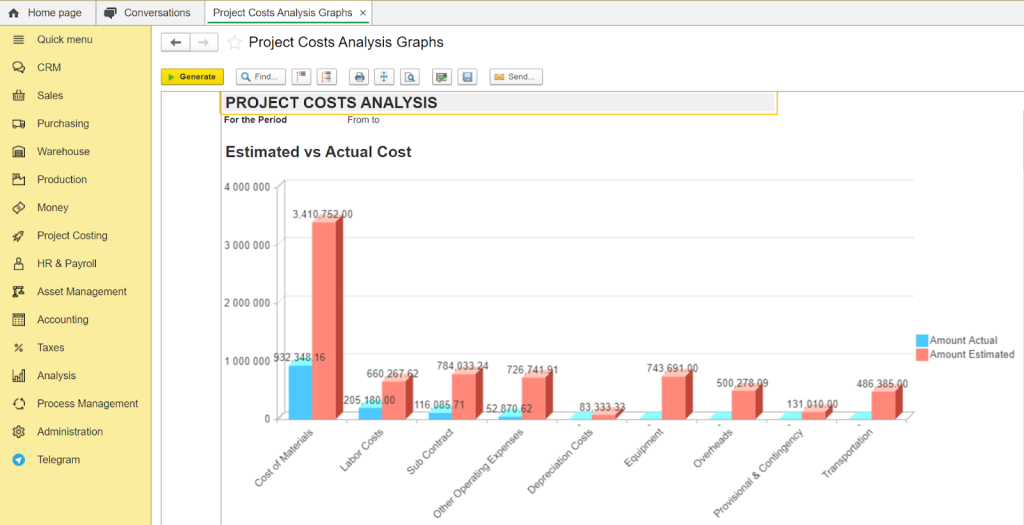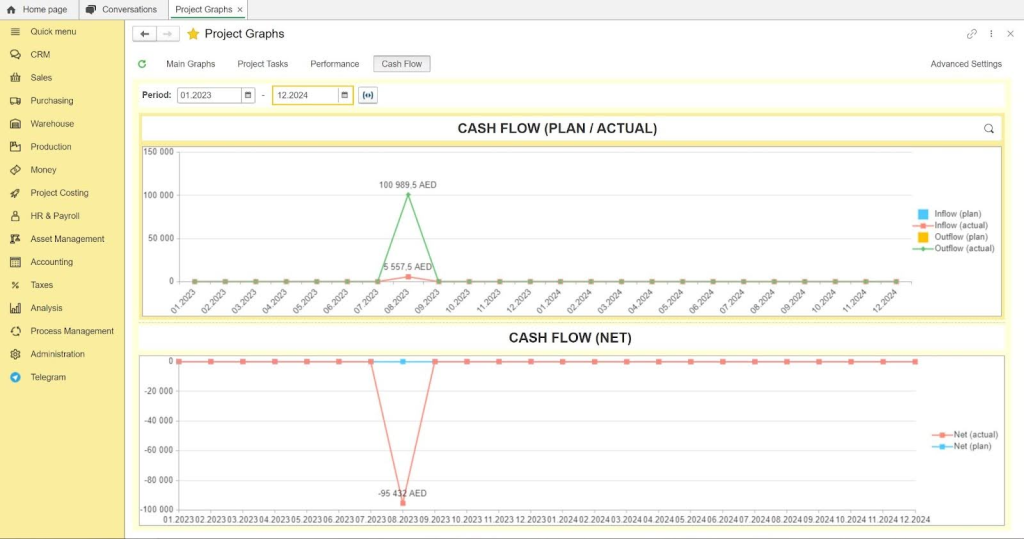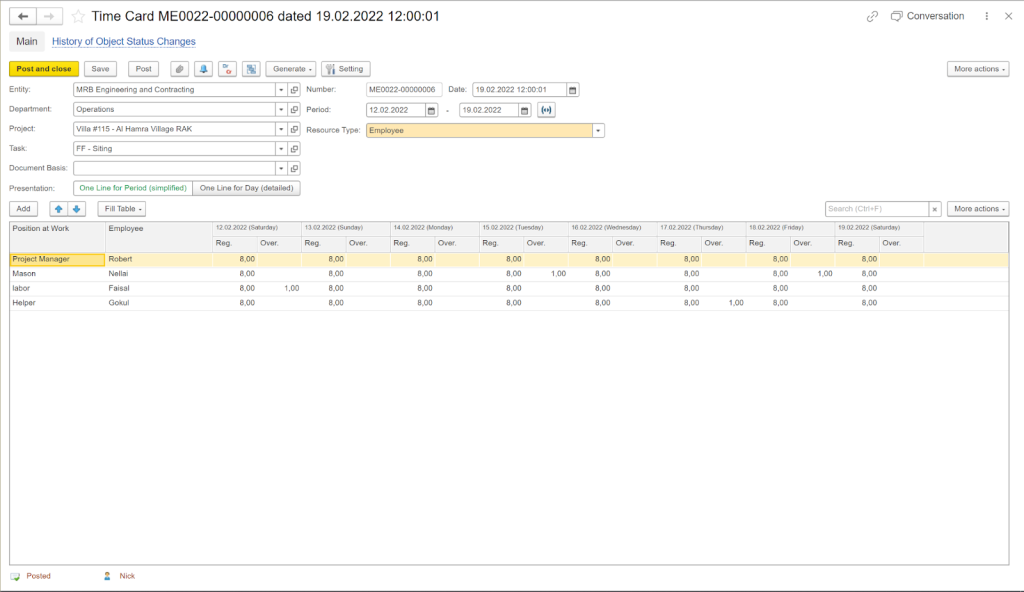Industrial automation is changing our life and transforming all sectors due to technological advancements, exemplified by the widespread adoption of ERP systems across various industries.
Over time, the size of a business has become less relevant. No company can ignore the capabilities of an enterprise resource planning, as they would be unable to survive without adjusting to technological advances. So what are the real advantages and disadvantages of an ERP system, and how do they impact efficiency and productivity in construction?
9 Benefits of Working with Construction ERP
Industrial automation is changing the way we live. Every construction business is concerned about losing out on business opportunities to its competitors as the market becomes increasingly customer-oriented and competitive. Here are the top 9 reasons why construction businesses need an ERP system.
1. Data Optimization
Due to its volume, managing data can be a major challenge for your businesses, so construction software provides a centralized hub for data, facilitating fast and secure transfers between departments. With ERP for construction companies, data storage is more efficient, enabling quick access to records. This standardized platform streamlines processes, enhancing overall efficiency.
2. Intelligent Planning & Analysis
Many global companies have suffered significant losses due to project delays and inefficient planning, leading to high labor costs and client dissatisfaction. Implementing construction software ensures efficient project management across multiple clients, minimizing downtime and contractual issues.
Enterprise resource planning features streamline operations and enhance cross-departmental coordination. Sometimes it’s pretty hard to make it handly, so for easier project control there is always real-time analysis of financial and operational data that provides executives with accurate insights.
Enterprise resource planning helps you in resource allocation, workforce utilization, and budget planning, avoiding unnecessary expenses and project delays.
3. Project Management Optimization
Sometimes you need to oversee projects across multiple sites, and to keep your eyes peeled, you may need special project monitoring features from enterprise resource planning.
These systems automate data tracking, streamline project information, and enhance project management efficiency. With enterprise resource planning in construction, managers can easily track project progress, delegate tasks, manage raw material requirements, and select suppliers and more.
Moreover, ERP's project management capabilities streamline customer billing and boost sales team productivity.
4. Estimation of Construction Costs and Revenues
Estimating all project aspects is crucial as it influences the bid's success, considering factors like design, company reputation, and client feasibility. Construction ERP software ensures accurate project costing management, considering raw materials, labor costs, and project duration variables. Additionally, it facilitates tracking your project’s revenue and losses.
5. Facilitating Information Sharing
Managing multiple projects can be overwhelming for large construction firms, especially when exchanging information. Traditional tools like Excel and PowerPoint can be efficient and safe, However, enterprise resource planning can give you more than that. It streamlines data sharing, enhances content quality, and fosters clear communication among team members, improving teamwork and more accurate outcomes.
Construction ERP systems ensure data security through advanced cloud platforms and firewalls. They offer contractors control over data access and enable them to set restrictions on sharing with clients or employees, further increasing operational visibility.
6. Diversification of Business Processes
In the construction industry, you permanently need to strive to enhance stability, risk management, and cost-effectiveness. It is impossible to control these processes on your own all the time, even with the help of hired workers. However, the situation can be greatly simplified by integrating into your business the ERP system that will divide business processes into modules. Here, some of them:
-
Finance & accounting
-
Inventory management
-
HR & payroll
-
Project costing
-
Procurement
These modules help you achieve the goals and maintain the results. Also, this segmentation fosters better process management and ensures compliance with regulatory requirements. This is another factor when weighing the advantages and disadvantages of enterprise resource planning adoption.
7. Enriching Decision-Making
An ERP system streamlines decision-making by providing a comprehensive overview of business operations. It enables staff to extract and modify data effectively, ensuring thorough consideration before making conclusions.
Additionally, enterprise resource planning usually has built-in chat forums and video capabilities which facilitate seamless communication among your employees. For instance, when purchasing raw materials, the system can coordinate various parties involved, from budget reports to purchase orders, streamlining the process and ensuring accuracy.
8. Increasing ROI (Return on Investment)
Investing in construction software offers benefits that directly contribute to a company's return-on-investment (ROI). By streamlining operations, reducing costs, and increasing efficiency, ERP software allows construction companies to complete projects more effectively and generate higher profit margins.
Ыoftware helps you eliminate manual and time-consuming processes, freeing up resources for other strategic initiatives. With improved project management, streamlined financial processes, efficient resource allocation, integrated procurement, and real-time reporting, construction companies can optimize their operations and achieve a higher.
9. Enhancement of the System's Efficiency
Construction software provides data gathering and presentation, enhanced efficiency by providing a consolidated view of relevant criteria for decision-making. For instance, when a project manager decides to procure raw materials, the budget report guides their consultation with the engineering team to formulate a construction design.
Subsequently, the purchasing manager creates a purchase order, which undergoes review and approval by the accounting department. Without an ERP system, coordinating interdepartmental transfers, revisions, and real-time monitoring would be significantly more challenging.
Getting Started with FirstBit ERP System
Numerous software choices are available in today's market. For entrepreneurs aiming to establish successful construction enterprises in Dubai and the UAE, FirstBit ERP System stands out. Tailored to suit businesses of all scales within the UAE's construction sector, this software offers a rich array of features to support contractors in flourishing within a competitive market landscape.
In FirstBit ERP, you can control your project lifecycle through resource management and its allocation.
With the help of customized smart dashboards for each project and task, you can assess all the statuses in real time and make informed operational decisions.
FirstBit ERP system allows you to customize and expedite your business processes, and monitor site activities and resources. Вaily/weekly/monthly progress, billing, receivables, attendance, petty cash, and other associated expenses are in a single system.
Finance management often causes special concern of contractors. With the FirstBit ERP solution, you can easily create budgets, manage your cash flow, and generate VAT reports. Monitor your solvency in just one click, forecast future financial situations and manage risks.
Also, FirstBit ERP system to manage your employees, including subcontractors and temporary workers and calculate payouts and track work hours in time cards easily.
ERP that saves your money
Adopt FirstBit ERP to cut costs, boost ROI, and effectively plan future cash flows
Request a demo
How Well Does the ERP Software Help Your Teams Collaborate?
An ERP software can significantly enhance collaboration and communication in your construction project. Here are some ways in which ERP software can improve your business:
-
Centralized Data. ERP systems provide a single source of truth for all departments, ensuring that everyone has access to the same accurate and up-to-date data.
-
Real-time Data Updates. ERP systems allow employees to access real-time data updates, enabling them to make informed decisions based on the most current information.
-
Project Management Tools. ERP systems often provide project management tools that allow teams to collaborate on tasks, assign responsibilities, track progress, and set deadlines.
-
Customer Communications. ERP systems can improve customer communications by providing built-in email management and centralizing customer communication history.
-
Workflow Automation. ERP systems can automate routine tasks, freeing up employees to focus on more strategic and value-added activities.
Do the ERP Benefits Justify the Cost?
The benefits of an ERP system, such as improved efficiency, better data accuracy, increased visibility, and improved customer service, can justify the cost if they lead to significant cost savings and increased productivity. By accurately calculating the ROI of an ERP system, businesses can make informed decisions about whether the investment is financially justifiable and aligns with their strategic goals.
For convenient use, we customize the FirstBit ERP system for your construction business’ needs. The software allows you to consider the size of your project, priorities, milestones, and of course your budget.
Is There a Trial Period?
Usually, ERP implementation companies tend to provide a temporary demo version of the product to the client. This may depend on the subjective views of these companies.
A trial period for implementation ща enterprise resource planning can offer several benefits to businesses and organizations. These benefits include:
-
Product Experience. A trial period allows users to explore the ERP system and discover its features and capabilities, which can help them determine if the system is a good fit for their needs.
-
Psychological Benefits. A trial period can create a sense of ownership and urgency, as users feel a need to make a decision before the trial period ends. It can also ease the fear of commitment, as users can see what they're missing out on without having to spend money upfront.
-
Data Capture. A trial period allows businesses to gather critical information about potential customers, including their personal information and usage patterns. This data can be used to improve the product and onboarding process.
-
Actionable Feedback. A trial period can be a more straightforward and effective way of getting user feedback on the product or service, as users are more likely to provide feedback when they are using the product in a real-world setting.
-
Limited Risk. A trial period allows businesses to try out the software without any costs before making an important investment. This ability to access and try all of the software features, without limitations, allows businesses to select the right system with limited risk or sunken costs.
While a trial period can offer many benefits, it is important to note that not all free trials are built the same. Some trial options may require payment information upfront, while others may only allow a limited number of users or active projects. It is important to carefully consider the terms of the trial and choose the option that best meets the needs of the business.
In First Bit, we provide the trial for using ERP solutions to our clients within three days. In three days you will be able to familiarize yourself with the system, understand its working principle. Our support will be with you in touch.
How Does the ERP System Impact Bottom-Line Results?
-
Centralized data eliminates the need for employees to rely on outdated or inconsistent information, reducing misunderstandings and errors in work.
-
Real-time data updates fosters better collaboration between teams as they can work on common goals and objectives using the same data.
-
Project management tools streamline project workflows and ensure that everyone is aligned and working towards the same objectives.
-
Workflow automation can lead to improved productivity and efficiency within the organization.
Everything you need for success in one powerful ERP solution
Request a demo
FAQ
What are the advantages and disadvantages of ERP?
What is the limitation of ERP?
What is the core benefit of an ERP system?
What are the disadvantages of ERP?

Anna Fischer
Construction Content Writer

See FirstBit ERP solutions in action
Discover how our system solves the unique challenges of contractors in a personalized demo.
After the demo you will get a quotation for your company.
After the demo you will get a quotation for your company.














